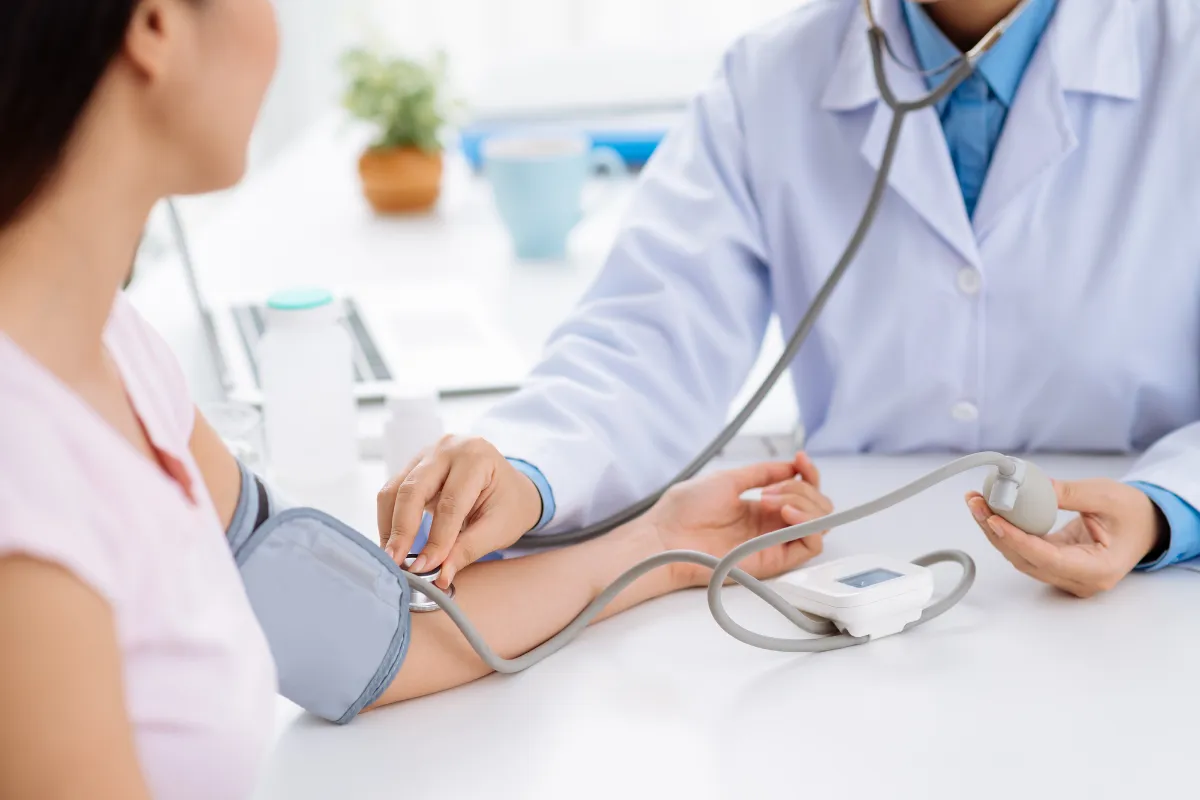Blood Pressure Checks: Regular Monitoring in Spring, TX
Are you feeling more tired than usual?
Experiencing headaches that won’t go away?
It could be related to your blood pressure.
Regular blood pressure checks are a simple yet crucial step in maintaining your overall health, especially here in Spring, TX.
It’s easy to overlook, but consistent monitoring can help detect potential problems early on.
Why Regular Blood Pressure Checks are Important
High blood pressure, or hypertension, often has no symptoms.
That’s why it’s called the “silent killer.”
Regular checks help you:
- Detect hypertension early.
- Monitor the effectiveness of treatments.
- Reduce your risk of heart disease, stroke, and kidney problems.
- Take proactive steps toward a healthier life.

Understanding Blood Pressure Readings
Blood pressure is measured with two numbers: systolic (the top number) and diastolic (the bottom number).
Let’s break it down:
- Systolic: Measures the pressure in your arteries when your heart beats.
- Diastolic: Measures the pressure in your arteries when your heart rests between beats.
Blood Pressure Categories
- Normal: Less than 120/80 mm Hg
- Elevated: Systolic between 120-129 and diastolic less than 80
- High Blood Pressure (Hypertension) Stage 1: Systolic between 130-139 or diastolic between 80-89
- High Blood Pressure (Hypertension) Stage 2: Systolic 140 or higher or diastolic 90 or higher
- Hypertensive Crisis: Systolic higher than 180 and/or diastolic higher than 120 (requires immediate medical attention)
Where to Get Your Blood Pressure Checked in Spring, TX
You have several options for getting your blood pressure checked:
- Doctor’s Office: Your primary care physician is an excellent resource. Consider scheduling an annual physical.
- Pharmacies: Many pharmacies offer free blood pressure screenings.
- Home Monitoring: Home blood pressure monitors are convenient for regular checks.

At Dr. A Patient Care, located at 5523 Louetta Rd STE C, Spring, TX 77379, we offer comprehensive blood pressure monitoring as part of our wellness visits.
Home Blood Pressure Monitoring: A Quick Guide
If you choose to monitor your blood pressure at home, here are some tips:
- Use a validated blood pressure monitor.
- Take readings at the same time each day.
- Sit quietly for 5 minutes before taking a reading.
- Record your readings and share them with your doctor.
Lifestyle Changes to Lower Blood Pressure
In addition to regular monitoring, lifestyle changes can significantly impact your blood pressure:
- Diet: Follow a heart-healthy diet low in sodium and saturated fat.
- Exercise: Aim for at least 30 minutes of moderate-intensity exercise most days of the week.
- Weight Management: Maintaining a healthy weight can help lower blood pressure. Learn more about our weight loss management programs.
- Stress Management: Practice relaxation techniques like yoga or meditation. We also offer mental health support.
- Limit Alcohol: If you drink alcohol, do so in moderation.
- Quit Smoking: Smoking raises blood pressure.
Blood Pressure Monitoring Options Compared
| Feature | Doctor’s Office | Pharmacy | Home Monitoring |
|---|---|---|---|
| Convenience | Requires appointment | Convenient, often walk-in | Most convenient |
| Accuracy | Highly accurate | Generally accurate | Depends on device and technique |
| Additional Services | Comprehensive health assessment | Limited health advice | None |
| Cost | Covered by insurance, co-pay may apply | Often free | Initial cost of monitor |
Considering your options?
We can help!
Call us at 346-550-8220 or book a consultation to get started.

When to See a Doctor
Consult your doctor if:
- You have consistently high blood pressure readings.
- You experience symptoms like severe headache, chest pain, or shortness of breath.
- You have questions or concerns about your blood pressure.
What is considered a normal blood pressure reading?
A normal blood pressure reading is typically considered to be less than 120/80 mm Hg.
How often should I get my blood pressure checked?
The frequency of blood pressure checks depends on your individual risk factors and current blood pressure readings.
Discuss this with your doctor during your annual physicals in Spring, TX
Can stress affect my blood pressure?
Yes, stress can temporarily increase your blood pressure.
Managing stress through relaxation techniques can help keep your blood pressure in check. We offer mental health support at our clinic.
What is considered a normal blood pressure reading?
A normal blood pressure reading is typically considered to be less than 120/80 mm Hg.
How often should I get my blood pressure checked?
The frequency of blood pressure checks depends on your individual risk factors and current blood pressure readings.
Discuss this with your doctor during your annual physicals in Spring, TX
Can stress affect my blood pressure?
Yes, stress can temporarily increase your blood pressure.
Managing stress through relaxation techniques can help keep your blood pressure in check. We offer mental health support at our clinic.
FAQs
Taking control of your health starts with understanding your numbers.
Regular blood pressure checks are an easy and effective way to stay proactive.
Remember, early detection and management are key to preventing serious health problems.
Make Blood Pressure Checks: Regular Monitoring in Spring, TX a priority and enjoy a healthier, happier life.


